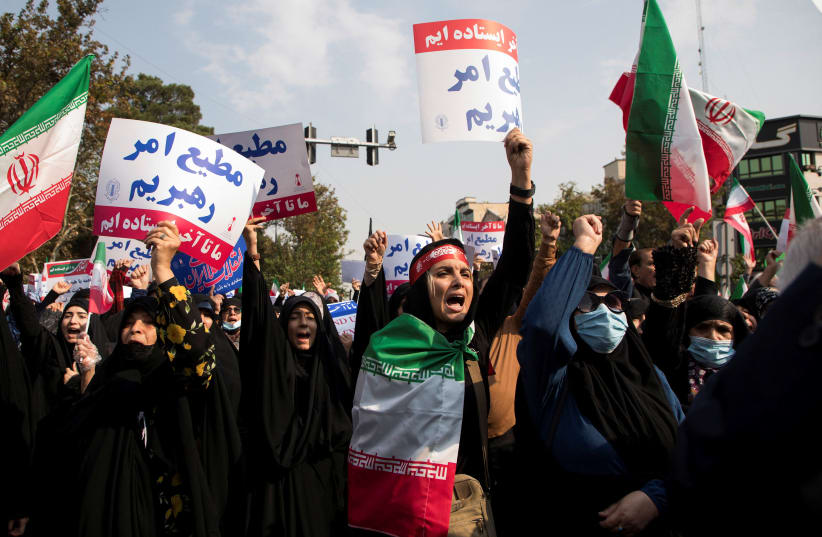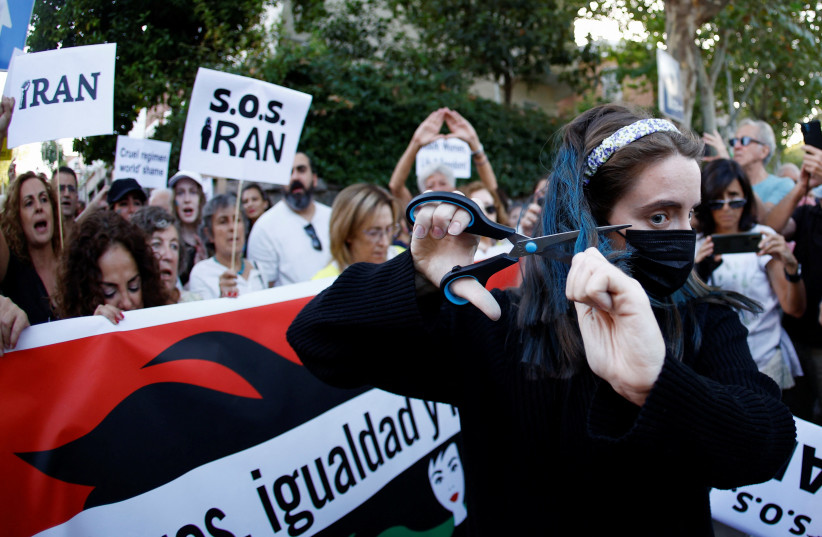Growing Iranian support for regime change has come together with widespread secularization, a new study published by the Tony Blair Institute found.
Polls conducted by The Group for Analyzing and Measuring attitudes in Iran (GAMAAN) show a clear connection between a majority of Iranians supporting greater secularization and seeking to overthrow the current Islamist regime.
Most Iranian men (70%) and women (74%) oppose the compulsory hijab, the issue that sparked the current mass protests across the country, after Iran’s morality police arrested Mahsa Amini for not covering enough of her hair. She died in custody under suspicious circumstances. Only 13% of women and 17% of men support the compulsory hijab.
Of those who oppose the compulsory hijab, 84% want regime change.
Over three-fourths (76%) of Iranians supporting regime change say religion is unimportant in their lives.Secularization trends cut across age groups and the rural-urban divide, the study found.
Only 28% of rural Iranians and 21% of urban Iranians support the compulsory hijab. Only 26% of urban Iranians pray five times a day, while 33% of rural Iranians do.
Among respondents aged 20-29, 78% opposed the compulsory hijab, 68% of those 30-49 felt the same, and 74% over age 50 did. Only 18% of 20-29-year-olds pray five times a day, 30% of those aged 30-49 do and 34% of respondents age 50 and up do so.
Kasra Aarabi, Iran Program Lead in the Tony Blair Institute’s Extremism Policy Unit and co-author of the paper pointed out that in the past decade, Iran’s nuclear program was the prism through which the West almost exclusively viewed the country, and it colored how protests in Iran were viewed, as well.
Seeking not only reform, but also regime change
However, Aarabi said, “since 2017, the new trend of unrest in Iran has been explicitly anti-regime, something we are witnessing again with the ongoing protests. The polling published in our paper today makes it absolutely clear that these protests are not about reform but outright regime change.”
Jemima Shelley, a Tony Blair Institute researcher and co-author of the study, said the West was caught off-guard by the latest protests because they did not recognize the secularization of Iranian society.
“Our data reveals the progressive attitudes held by Iranian men and how they reject the clerical regime’s misogynistic prescriptions,” she said.
The hijab is a symbol of the role of religion in the Islamic Republic and therefore removing it has become the icon of recent months’ demonstrations, Aarabi said.
“Religious law is the central DNA of the theocratic regime and its very existence. This is why Iranians are not seeking reform – but outright regime change,” he stated.
“This data from the past two years demonstrates that the events unfolding in Iran today are far from a flash in the pan,” Aarabi said. “Western policymakers should recognize this and seek a consensus on a confident recalibration of policy towards Iran which advances the interests of the Iranian people.”
Former UK prime minister Tony Blair said the study shows that “it is time we in the West recalibrate our policy in a way that draws a clear distinction between the people of Iran and the Islamic Republic. Our efforts should serve the former.”
Blair commended the “extraordinary bravery and courage” of the Iranian people, and said that “the single most liberating event for the Middle East will come when the Iranian people finally have their freedom.”
"Neither [Iranians] nor their country should be defined by the Islamic Republic."
-Tony Blair, former UK Prime Minister
“Neither [Iranians] nor their country should be defined by the Islamic Republic,” Blair added. “As a great people, whose history and civilization are rich and varied, it is they and they alone who should define their own future. This is why I firmly believe it is in our interests today, in the West, to show our deep solidarity with the protesters risking their lives for what we so often take for granted.”
The Tony Blair Institute used cross-tabulations of GAMAAN’s surveys with sample sets of 39,981 in 2020 and 16,850 in 2022 in its study to demonstrate the link between opposition to hijab laws and opposition to the regime.
GAMAAN uses digital tools and alternate polling methods, such as encrypted online surveys with large, varied samples, to learn the accurate opinions of Iranians without respondents having to fear for their safety.

